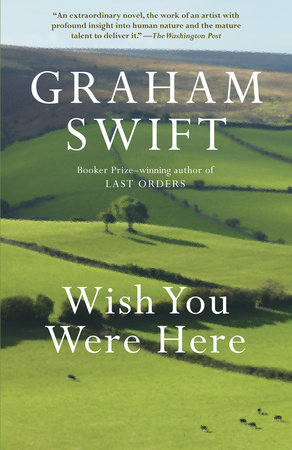Wish You Were Here Reader’s Guide
By Graham Swift


1. “Wish you were here” is a powerful phrase in the novel. Why is it so significant?
2. Jack says, “…cattle aren’t people, that’s a fact” (p. 4). But in what ways in the novel are cattle like people, or vice versa?
3. What parallels can you draw between Jack and Tom and the earlier pair of Luxton brothers?
4. “To become the proprietor of the very opposite thing to that deep-rooted farmhouse. Holiday homes, on wheels.” (p. 29) What is Swift telling us through Jack’s observation?
5. What does their Caribbean holiday symbolize to Ellie? To Jack?
6. Did Jack really want to leave Devon, ten years earlier? If Ellie hadn’t suggested the Isle of Wight, what do you think might have happened?
7. Before they move, Jack sells the ancestral Luxton cradle, but keeps the shotgun and the medal. Why?
8. Madness comes up again and again—mad-cow disease, the madness of war, the possibility that Jack has gone mad. What point is Swift making?
9. Time shifts frequently over the course of the novel, hopscotching across decades. How does Swift use these shifts to expand and deepen the story?
10. Why does Ellie refuse to accompany Jack back to Devon?
11. Why is putting down Luke such a pivotal act for Tom and Jack?
12. What do we learn when Swift shifts from Jack’s point of view to others’—Major Richards’s, the hearse driver’s, Bob Ireton’s? What do we learn from the brief section told from Tom’s perspective?
13. At several points, Swift writes extended hypothetical passages—what might have happened if one character had said or done something slightly different. What effect does this have? How does it help to fully form the characters?
14. How does the Robinsons’ transformation of Jebb Farm work as a metaphor for twenty-first-century life?
15. “. . . anyone (including the owners of Jebb Farmhouse, had they been in occupation) might have seen two hand-prints on the top rail, one either side of the black-lettered name.” (p. 267) What do Jack’s hand-prints symbolize?
16. “Security” means different things to the Luxtons and the Robinsons. Which definition do you think Swift endorses?
17. What does the medal represent? What does it mean when Jack tosses it into the sea?
18. Does Tom really believe Ellie had a hand in Jimmy’s death? Why does he say it?
19. Tom’s ghost plays a major role in the novel’s final scene. What does he represent?
Just for joining you’ll get personalized recommendations on your dashboard daily and features only for members.
Find Out More Join Now Sign In